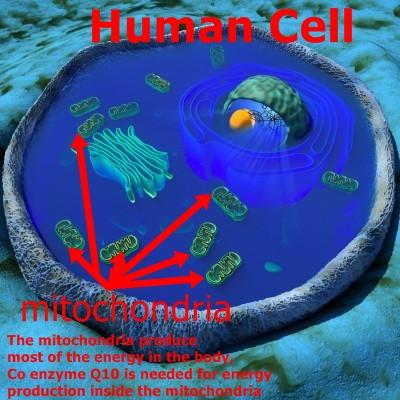In the last few years important discoveries have been made about co-enzyme Q10 also called coQ10 or co Q10. It is best known for the role it has in the body to produce energy and improve cardiovascular health[1, 2] [3, 4]. Co-enzyme Q10 is a crucial part of the process of energy production within the mitochodria found in most cells of the body.

Statin drugs prescribed to combat high cholesterol have now been found to lower co-enzyme Q10
Statin drugs (atorvastatin) which are prescribed to combat high cholesterol have ben found to cause co-enzyme Q10 levels to drop [5]. This may explain some of the adverse effects of statins such as exercise intolerance and muscle pain [5]. Supplements of co-enzyme Q10 have been shown to improve cardiovascular health over a four week period, further improvement occurs if co enzyme Q10 is combined with exercise [6]. It is now recommended that supplements of co-enzyme Q10 are taken with any statin medication [7].
If the arteries become too rigid due to cardiovascular disease, the body struggles to move the blood. Co-enzyme Q10 can help the arteries regain elasticity. A study last year found that people given co-enzyme Q10 along with vitamin C, vitamin E and selenium which are other protective antioxidants, found not only did this combination improve artery elasticity but it also improved glucose and fat metabolism, and decreased blood pressure [8].
Blood levels of co-enzyme Q10 were much lower in people with depression

Chronic fatigue syndrome and Co Q10
The same research team that found people with depression and chronic fatigue syndrome, had the lowest levels of co-enzyme Q10 [9], completed a further study that found people with chronic fatigue syndrome with extremely low co-enzyme Q10 had the most problems with memory and concentration. The team suggested co-enzyme Q10 supplementation is likely to be especially helpful in this situation, as people with chronic fatigue syndrome generally die from chronic heart failure 25 years younger than the general population [10].
Where can you get co-enzyme Q10?
Co-enzyme Q10 is available from supplements; if I use supplements I recommend the Entire Katoa Food State range for the optimum absorption, low dose and low toxicity. Some co-enzyme Q10 is present in animal products, but the amounts and bioavailability varies. The good news is that the body does make co-enzyme Q10. So you may well be making adequate amounts. Unfortunately the ability to make co-enzyme Q10 is more likely to drop as people age.
Do you need more co-enzyme Q10 ?
If you take any statin medication, you need to take supplements of co-enzyme Q10 [7]. Some of the signs it may be low are cardiovascular problems, low energy, chronic fatigue, depression that does not respond to treatment, and gums that bleed very easily. Any of these could have other causes. Naturopathy is based on helping every part of your body to work well. This means that to improve one symptom, say high cholesterol, we look not only at the problems directly related to high cholesterol, but also to the other problems that may have contributed to it. Naturopaths also use more than one solution to helping you regain health. There are many naturopathic treatments; herbal medicines, and nutrient rich diets tailored to your specific needs that can help improve your cardiovascular health, lower cholesterol, improve energy, and alleviate depression.
Contact Bay Health Clinic today to find out more or to book a consultation with one of our Naturopaths; if needed they will also prepare tailored herbal medicines and recommend supplements to help you feel your best. Call 07 571 3226 or email us: ask@bayhealth.nz
Read more about how you can help your Heart and circulation
Links to Other Articles Relating to this...
Copyright Jaine Kirtley Registered Naturopath (NZ Soc Naturopaths), Registered Nurse (mental Health)
All information contained in this site is for general interest and not a substitute for professional advice.
References
Click on the title to a link to the reference
1. Kumar A, Kaur H, Devi P, Mohan V: Role of coenzyme Q10 (CoQ10) in cardiac disease, hypertension and Meniere-like syndrome. Pharmacol Ther 2009, 124(3):259-268.
2. Molyneux SL, Florkowski CM, George PM, Pilbrow AP, Frampton CM, Lever M, Richards AM: Coenzyme Q10: an independent predictor of mortality in chronic heart failure. J Am Coll Cardiol 2008, 52(18):1435-1441.
3. Adarsh K, Kaur H, Mohan V: Coenzyme Q10 (CoQ10) in isolated diastolic heart failure in hypertrophic cardiomyopathy (HCM). BioFactors 2008, 32(1-4):145-149.
4. Belardinelli R, Mucaj A, Lacalaprice F, Solenghi M, Principi F, Tiano L, Littarru GP: Coenzyme Q10 improves contractility of dysfunctional myocardium in chronic heart failure. BioFactors 2005, 25(1-4):137-145.
5. Rundek T, Naini A, Sacco R, Coates K, DiMauro S: Atorvastatin Decreases the Coenzyme Q10 Level in the Blood of Patients at Risk for Cardiovascular Disease and Stroke. Arch Neurol 2004, 61(6):889-892.
6. Belardinelli R, Mucaj A, Lacalaprice F, Solenghi M, Seddaiu G, Principi F, Tiano L, Littarru GP: Coenzyme Q10 and exercise training in chronic heart failure. Eur Heart J 2006, 27(22):2675-2681.
7. Blum S, Milman U, Shapira C, Miller-Lotan R, Bennett L, Kostenko M, Landau M, Keidar S, Levy Y, Khemlin A et al: Dual therapy with statins and antioxidants is superior to statins alone in decreasing the risk of cardiovascular disease in a subgroup of middle-aged individuals with both diabetes mellitus and the haptoglobin 2-2 genotype. Arterioscler Thromb Vasc Biol 2008, 28(3):e18-20.
8. Shargorodsky M, Debby O, Matas Z, Zimlichman R: Effect of long-term treatment with antioxidants (vitamin C, vitamin E, coenzyme Q10 and selenium) on arterial compliance, humoral factors and inflammatory markers in patients with multiple cardiovascular risk factors. Nutr Metab (Lond) 2010, 7:55.
9. Maes M, Mihaylova I, Kubera M, Uytterhoeven M, Vrydags N, Bosmans E: Lower plasma Coenzyme Q10 in depression: a marker for treatment resistance and chronic fatigue in depression and a risk factor to cardiovascular disorder in that illness. Neuro Endocrinol Lett 2009, 30(4):462-469.
10. Maes M, Mihaylova I, Kubera M, Uytterhoeven M, Vrydags N, Bosmans E: Coenzyme Q10 deficiency in myalgic encephalomyelitis/chronic fatigue syndrome (ME/CFS) is related to fatigue, autonomic and neurocognitive symptoms and is another risk factor explaining the early mortality in ME/CFS due to cardiovascular disorder. Neuro Endocrinol Lett 2009, 30(4):470-476.
Blood levels of co-enzyme Q10 were much lower in people with depression
Problems with the heart and circulation occur more often in people who also have depression. A research team found that the blood levels of co-enzyme Q10 were much lower in people with depression than those without depression. Of those people with depression the ones who had depression that did not respond to antidepressants and those with chronic fatigue syndrome had the lowest levels of co-enzyme Q10[9].

Please click here to add text and other content
FIND OUT MORE ABOUT...